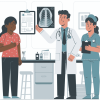
What Is The Benefit Of Collecting Feedback From Patients?
Collecting feedback from patients is a crucial part of healthcare. It helps in improving patient satisfaction and the quality of care. This guide will explain why gathering feedback is so important and how it benefits both patients and healthcare providers.
Why Collecting Feedback from Patients Matters
Collecting feedback from patients is very important in healthcare. It helps understand what patients like and where things can improve, highlighting the importance of patient feedback to ensure they receive better care and feel happier with the service.
1. Boosting Patient Satisfaction
Collecting feedback from patients gives valuable insights into their experiences. It helps healthcare providers understand what patients like and where they see room for improvement. This feedback leads to better services and happier patients.
2. Improving Care Quality
Patient feedback shows where care might be lacking. By addressing these issues, healthcare providers can enhance their services. Regular feedback helps in spotting trends and making necessary improvements, leading to higher-quality care.
3. Encouraging Patient Engagement
When patients see that their feedback is taken seriously, they become more involved in their care. This active participation can lead to better adherence to treatment plans and a stronger relationship with healthcare providers.
4. Finding Strengths and Weaknesses
Feedback helps in identifying what’s working well and what needs attention. Positive comments show strengths, while constructive criticism points out areas for improvement. This balanced view is essential for ongoing enhancement.
5. Improving Communication
Collecting feedback from patients promotes open communication. When patients feel their opinions are valued, it builds trust and improves the relationship between patients and healthcare providers.
Ways to Collect Patient Feedback
Collecting patient feedback is very important to make healthcare better. It helps doctors and hospitals know what patients need and how they can improve. Let’s see some simple ways to gather this feedback.
1. Surveys
Surveys are a common way to collect patient feedback. Whether online, by mail, or in person, LazyMonkey surveys are designed to gather insights into various aspects of care, such as service quality, staff behavior, and facility conditions.
Click here to get in touch with Lazy Monkey.
2. Focus Groups
Focus groups involve small groups of patients discussing their experiences. This method provides in-depth insights that might not be captured in surveys and helps in exploring complex issues.
3. Comment Cards
Comment cards are simple and effective for gathering feedback. Patients can fill them out anonymously after their visit. These cards are easy to distribute and collect, making them a convenient option.
4. Online Reviews
Online reviews on platforms like Google or Healthgrades offer valuable information about patient experiences. Monitoring these reviews allows healthcare providers to address concerns quickly and acknowledge positive feedback.
5. Direct Interviews
One-on-one interviews with patients provide detailed feedback. These can be done in person or over the phone, allowing for a deeper understanding of patient experiences and concerns.
How to Collect Feedback from Patients Effectively
Collecting patient feedback is important to improve healthcare services. Simple methods help you get honest opinions, making it easier to provide better care and keep patients happy. Here’s how to do it effectively.
1. Ensure Anonymity
Patients are more likely to provide honest feedback if they can do so anonymously. Anonymity encourages them to share their true opinions without fear.
2. Make It Easy
The process of giving feedback should be simple and convenient. Use accessible formats and clear instructions to encourage more patients to participate.
3. Act on Feedback
Collecting feedback is useful only if it leads to action. Analyze the feedback, identify key issues, and make improvements. Letting patients know what changes have been made shows that their feedback is valued.
4. Review Feedback Regularly
Regularly reviewing feedback helps in tracking progress and spotting new trends. This continuous review allows healthcare providers to stay updated on patient needs and make timely adjustments.
5. Create a Feedback Culture
Encourage a culture where feedback is welcomed and acted upon. Training staff to handle feedback positively and constructively can lead to more effective use of patient opinions.
Benefits of Regularly Collecting Feedback from Patients
Regularly asking patients for their feedback helps improve healthcare. It shows where changes are needed, makes patients happier, and leads to better care overall.
Offering patient feedback rewards can further encourage participation, increasing the volume and quality of feedback received. Understanding the benefits of patient surveys helps healthcare providers gather actionable insights to enhance patient experience.
1. Continuous Improvement
Regular feedback provides ongoing insights into patient experiences. This helps in making continuous improvements and refining services over time.
2. Better Patient Outcomes
Using feedback to enhance care quality often leads to improved patient outcomes. Addressing concerns and making necessary changes can result in more effective treatments and better health.
3. Increased Patient Retention
Satisfied patients are more likely to return and recommend the healthcare facility to others. Regular feedback and subsequent improvements can boost patient retention and attract new patients.
4. Enhanced Reputation
A healthcare facility that values and acts on patient feedback builds a strong reputation. Positive reviews and word-of-mouth recommendations contribute to a good image and increased trust.
5. Compliance and Accreditation
Many healthcare accreditation bodies require patient feedback as part of their standards. Collecting and using feedback helps in meeting these requirements and maintaining accreditation.
Conclusion
Collecting feedback from patients is vital for improving healthcare services. It helps in enhancing patient satisfaction, care quality, and communication. By using feedback effectively.
Healthcare providers can make meaningful improvements and build stronger relationships with their patients. Embracing patient feedback as a valuable resource is key to achieving excellence in healthcare.
Frequently Asked Questions
How Often Should Feedback Be Collected From Patients?
Feedback should be collected regularly, through periodic surveys or other methods, to ensure ongoing improvements.
What Types Of Feedback Are Most Valuable?
Both positive and constructive feedback are valuable. Positive feedback highlights strengths, while constructive criticism points out areas for improvement.
How Can Healthcare Providers Encourage More Patients To Give Feedback?
Providers can encourage feedback by making the process easy and anonymous. Explaining the importance of feedback and how it leads to improvements can also increase participation.
What Should Be Done With Negative Feedback?
Negative feedback should be carefully analyzed to identify and address underlying issues. Communicating the actions taken to resolve concerns is important.
How Can Doctors Collect Feedback From Patients?
Doctors can collect patient feedback through QR codes, online surveys, feedback forms, email requests, mobile apps, text messages, and in-person interviews to improve care and patient satisfaction.
Why Is It Important To Collect Private Clinic Patient Feedback?
Collecting private clinic patient feedback helps improve service quality, build patient trust, identify areas for improvement, enhance satisfaction, and ensure a better overall healthcare experience.
Enhance Patient Care and NABH Compliance with LazyMonkey
LazyMonkey is your all-in-one solution for improving patient care, retaining more patients, and meeting NABH standards. Our powerful QR-based feedback tool enables you to capture real-time insights from patient feedback, discharge surveys, staff and doctor evaluations, and clinical research, while also streamlining inter-departmental communication.
Transform your healthcare facility today - reach out to us at hello@lazymonkey.in, or request a demo here!
Elevate Your Restaurant Experience with LazyMonkey
LazyMonkey’s QR-based feedback system helps you gather real-time insights from customers, track satisfaction levels, and enhance the dining experience. Get instant feedback on your menu, service, and ambience, and make data-driven improvements to boost repeat customers and reviews.
Improve your restaurant today – reach out to us at hello@lazymonkey.in, or request a demo here!
Empower Student Engagement and Campus Improvement with LazyMonkey
LazyMonkey offers a seamless way to gather student feedback, track satisfaction, and enhance campus life. From course evaluations to dorm feedback, our QR-based solution makes it easy to capture valuable insights and improve student retention.
Upgrade your university experience – contact us at hello@lazymonkey.in, or request a demo here!
Streamline Feedback and Drive Performance Across Your Enterprise/Franchise with LazyMonkey
Whether you manage one or multiple locations, LazyMonkey’s QR-based feedback system helps you gather real-time employee and customer feedback. Improve operational efficiency, track satisfaction, and make data-driven decisions to enhance brand consistency and growth.
Transform your franchise today – reach out to us at hello@lazymonkey.in, or request a demo here!
Enhance Customer Satisfaction and Service Standards in Banking with LazyMonkey
LazyMonkey empowers banks to capture real-time feedback from clients across branches. Improve customer experience, assess service quality, and ensure regulatory compliance with our QR-based solution, helping you retain clients and meet banking standards.
Elevate your bank’s customer care – contact us at hello@lazymonkey.in, or request a demo here!
Boost Customer Engagement and Mall Satisfaction with LazyMonkey
LazyMonkey’s QR-based feedback tool enables you to collect feedback from shoppers, track satisfaction, and enhance the mall experience. Gather insights on store services, cleanliness, and entertainment to create an unmatched customer journey.














